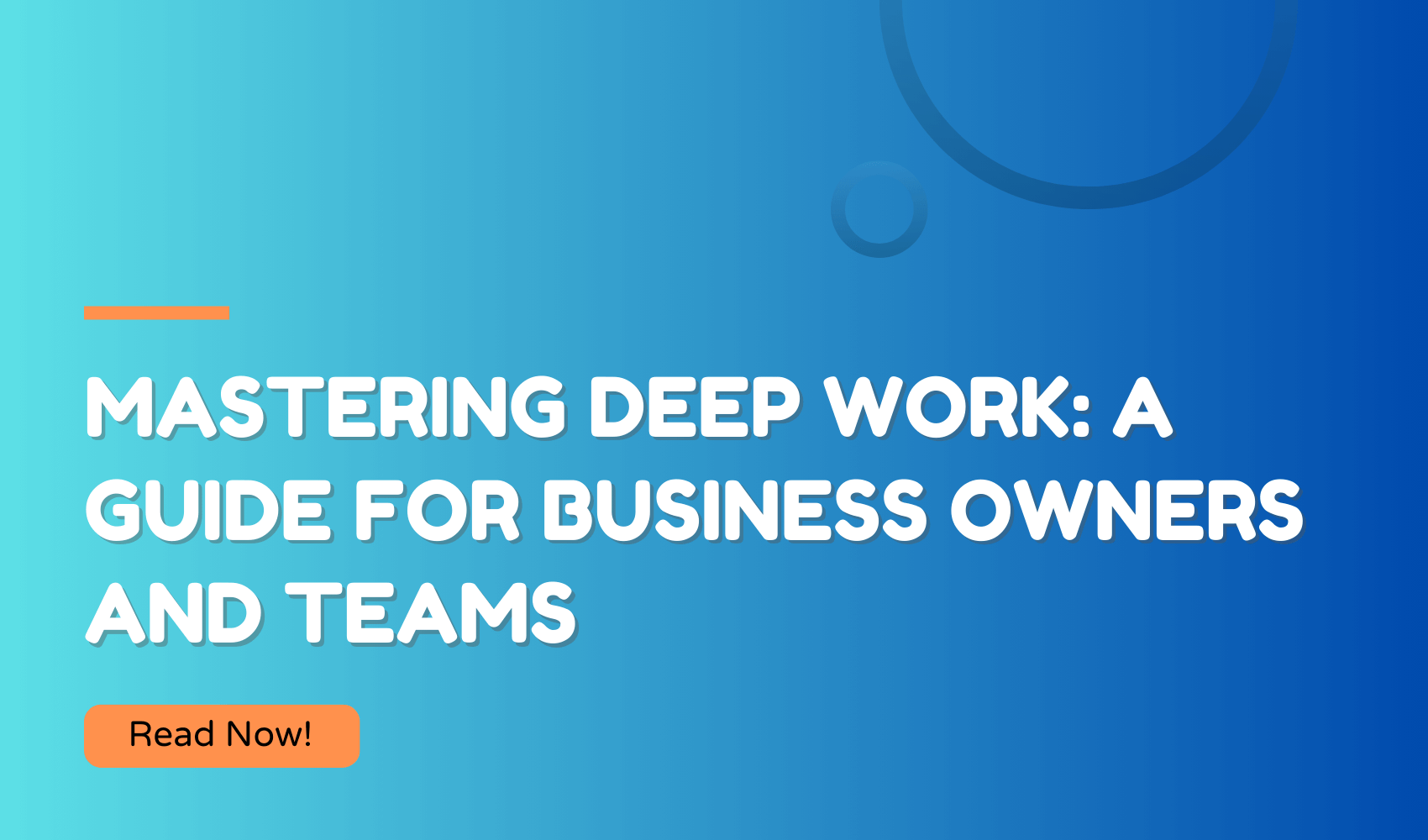Plan Your Best Year Ever – Come to GrowthCLUB
By: Tom Dougherty
Published: December 14, 2024

Running a business demands focus and strategy. Deep work—a term popularized by Cal Newport in his book Deep Work—offers a framework to maximize concentration and achieve meaningful outcomes. For business owners, it’s a way to unlock personal and team potential, fostering better results and stronger collaboration.
Adopting deep work principles isn’t just about working harder; it’s about working smarter. Let’s explore how this concept can transform productivity for you and your team.
Deep work refers to a state of focused, distraction-free effort where individuals engage in cognitively demanding tasks. Coined by Cal Newport, the term emphasizes the value of undistracted time in producing high-quality outcomes. Activities like strategy development, creative brainstorming, or problem-solving fall into this category.
In contrast, shallow work involves tasks that are easier to perform but offer minimal long-term value—think replying to routine emails or attending back-to-back meetings.
Newport defines deep work as “professional activities performed in a state of distraction-free concentration that push your cognitive capabilities to their limit.” It’s not just for individuals; businesses that integrate these principles experience enhanced innovation and efficiency.
A typical workday involves a mix of tasks, but not all tasks contribute equally to progress. The difference between deep work and shallow work lies in the focus and impact of each.
| Deep Work | Shallow Work |
|---|---|
| High-focus, cognitively demanding | Low-focus, repetitive tasks |
| Produces meaningful results | Often feels "busy" but less impactful |
| Requires intentional effort | Often reactive, e.g., responding to emails |
Deep work tasks, like creating a business strategy or solving a major problem, push mental boundaries and generate significant outcomes. In contrast, shallow work often creates the illusion of productivity while consuming energy on low-impact activities, such as sifting through emails or attending routine meetings.
For business owners, prioritizing deep work helps focus time and energy where it matters most, both personally and within the team. Encouraging team members to spend more time in deep work can lead to higher-quality results and innovation. Highlighting these distinctions is the first step in fostering a culture of meaningful productivity.
An example of deep work in action comes from Bill Gates, co-founder of Microsoft. Known for his disciplined focus, Gates often allocated uninterrupted time to think deeply and solve complex problems. His “Think Weeks” were legendary—periods of isolation devoted to reading, planning, and shaping the future of Microsoft. These sessions led to pivotal innovations that had a lasting impact on the tech industry.
Deep work fosters clarity and innovation, enabling leaders to tackle high-impact challenges effectively. Teams following this approach benefit from clearer goals and stronger collaboration. Focused effort shifts attention away from busywork and directs it toward meaningful actions that truly contribute to growth and success. Allocating time for deep focus is a proven method to achieve better outcomes in both leadership and teamwork.
Creating a culture that values deep work begins with actionable steps that both leaders and team members can follow:
Integrate uninterrupted focus time into the team calendar. These blocks should be respected across the organization to encourage productivity.
Example: Reserve two-hour slots for brainstorming sessions or high-priority projects.
➤ Set up quiet zones in the workspace where employees can focus without interruptions.
➤ Encourage the use of “do not disturb” settings on communication tools during focus periods.
Provide time-blocking templates or tools like Google Calendar, Notion, or Trello to help teams structure their day effectively.
Gather input from team members on what works well and what doesn’t. Regularly adjust strategies to create an environment conducive to focus.
Business owners can lead by example with these practical strategies:
➤ Begin each day with a clear plan for the most important tasks.
➤ Group similar tasks together to maintain focus and avoid switching between unrelated activities.
➤ Use techniques like the Pomodoro Method to balance focused work with short breaks.
➤ Evaluate progress weekly, both personally and across the team, to track the impact of deep work practices.
A focused work environment requires addressing common challenges. Below are answers to frequently asked questions about integrating deep work into daily routines:
A: Set “do not disturb” times and communicate these clearly to your team. Delegate urgent matters to someone trusted or create a system where only emergencies are escalated.
A: Start small by implementing one or two practices, such as focus blocks or quiet zones. Show the benefits of deep work through your own routine to encourage buy-in.
Leaders significantly influence how focus is valued within a team. For example, a CEO who consistently blocks time for deep work and openly shares their schedule with the team sets a clear precedent. By prioritizing meaningful work and limiting unnecessary interruptions, they encourage a similar approach among team members.
Actions such as reducing non-essential meetings, encouraging clear communication during focus periods, and providing resources for structured work help establish a deep work culture. Leading with these practices demonstrates the value of focused effort and promotes a more productive environment.
Deep work has the power to transform productivity and foster innovation within teams. A single change, such as dedicating time to focused effort, creates a foundation for meaningful progress. Begin by experimenting with time blocks or implementing a quiet zone policy, and track the results.
For more insights, consider exploring Cal Newport’s Deep Work or implementing the templates provided. Small, consistent actions today lead to better outcomes tomorrow.

At ActionCOACH of Arizona, we help entrepreneurs and business owners unlock their full potential with proven strategies, powerful coaching, and real results. Whether you're scaling, streamlining, or just starting out—we’ve got your back.